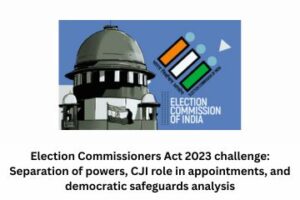Recent Amendments in Arbitration
Written by: G. MADHAVI LAKSHMI
INTRODUCTION
On 4 November 2020, the President of India promulgated the Arbitration and Conciliation (Amendment) Ordinance, 2020 (Ordinance), which amends sections 36 (Enforcement) and 43-J (Norms for accreditation) of the Arbitration and Conciliation Act, 1996 (Arbitration Act). The Ordinance also omits the eighth schedule of the Arbitration Act, which deals with the qualifications and experience of arbitrators.
While the new Proviso is a positive step, there are four key issues here that may require attention.
First, for a court to make an order under Section 36(3) (or the new Proviso) of the Act, there must be an application under Section 36(2) of the Act. That application is further dependent on the pendency of an application challenging the award under Section 34 of the Act. Interestingly, Section 34 does not contain any express provision for setting aside an award or refusing its enforcement if “the arbitration agreement or contract which is the basis of the award” was induced or affected by fraud or corruption.
As per Section 34(2) (b) (ii) of the Act, the only ground (in cases involving allegations of fraud or corruption) to refuse enforcement is where “the making of the award” was induced or affected by fraud or corruption. Therefore, one might argue that if the ground is not available for setting aside an award, how it can be available to an applicant seeking a stay of its enforcement.
Secondly, whether an arbitration agreement or a contract is affected by fraud or corruption is a matter of fact and ought to have been debated by the parties during the arbitration proceedings. In most cases, it would have been inquired in detail by the tribunal. To second-guess the tribunal’s reasoning and reappreciate the evidence would be contrary to the Proviso to Section 34(2A) of the Act, which states that “an award shall not be set aside merely on the ground of an erroneous application of the law or by reappreciation of evidence.”
Thirdly, a possible counter-argument may be that Section 34(2) (a) (ii) provides for setting aside an award where “the arbitration agreement is not valid under the law to which the parties have subjected it” and therefore, an arbitration agreement induced by fraud or corruption will be void under Indian law. But that again begs the following question: given that Section 34(2A) prevents the court from setting aside an award in an international commercial arbitration even when the award is vitiated by patent illegality on the face of it, how could the enforcement of the same award have stayed for illegality based on fraud or corruption?
Moreover, identifying such illegality may not be a straightforward exercise. While corruption in the “making of an award” may be identified by evaluating the tribunal’s conduct and is more a matter of procedure, corruption in procuring the underlying contract is a matter of merits and would, thus, require more than just prima facie evaluation of evidence.
Lastly, the mandate to unconditionally stay the enforcement in cases of corruption seems to lack logic or reasoning, especially when, in other situations, the court can exercise its discretion to put any applicant to such terms, as it deems fit, before granting any stay order.
Unconditional Stay of enforcement of arbitral award if the court finds fraud or corruption
Prior to 2015, a party challenging an arbitral award under section 34 of the Arbitration Act could benefit from an automatic stay against enforcement of the award under challenge. This resulted in an onslaught of challenges to stall the enforcement of arbitral awards. Taking note of the prevalence of such challenges, Section 36 of the Arbitration Act was amended in 2015 to provide for a conditional stay of arbitral awards by the court to ensure that an arbitral award was enforceable despite an appeal filed against it in the court.
The amendment empowered courts to stay the operation of the arbitral award, subject to conditions deemed fit. Further, to deter parties from filing unwarranted challenges to arbitral awards, the courts could direct a challenging party to deposit a sum pending the determination of the challenge proceedings.
The Ordinance now amends section 36 of the Arbitration Act and provides parties with an opportunity to seek an unconditional stay of enforcement of arbitral awards where the underlying arbitration agreement or contract or making of the arbitral award are induced by fraud or corruption. The proviso inserted by the Ordinance stipulates that the court is satisfied that a prima facie case has been made out, shall stay the award unconditionally pending disposal of the challenge under section 34 (Application for setting aside arbitral award) of the Arbitration Act.
Notably, the amendment is deemed to be effective from 23 October 2013. Since the proviso has retrospective application, an explanation has been inserted to clarify that the proviso shall apply to all court cases arising out of or in relation to arbitral proceedings, irrespective of whether the arbitral or court proceedings were commenced prior to or after the commencement of the Arbitration and Conciliation (Amendment) Act, 2015.
This amendment addresses challenges to Indian seated awards, and it does not apply to the enforcement of foreign arbitral awards, which is governed by a separate part of the Arbitration Act. Indian courts have the jurisdiction to refuse enforcement of a foreign arbitral award where it finds that the award was induced or affected by fraud as per section 48 of the Arbitration Act.
The Procedural Aspect
The temporal scope of Section 36 of the Act was the subject matter of some controversy in the past after it was amended by the Arbitration and Conciliation (Amendment) Act, 2015 (the ‘2015 Amendment’). It took some back and forth between the Indian government and the Supreme Court of India to conclusively resolve that issue (see previous pots on this blog here, here, and here). With the 2020 Amendment, it seems that judicial intervention in revisiting the same issue would not be needed. The Explanation to the new Proviso to Section 36(3) of the Act makes it abundantly clear that the said Proviso shall have retrospective effect and shall be deemed to have been inserted with effect from 23 October 2015 (i.e., the date on which the 2015 Amendment came into force). This is also in conformity with the decisions in BCCI v Kochi Cricket Pvt. Ltd. [1]and Hindustan Construction Co. v Union of India[2] where Section 36 of the Act was held to be retrospective in its applicability.
The 2020 Amendment further states that the new Proviso would apply to all court proceedings, irrespective of whether the court or underlying arbitral proceedings commenced before or after 23 October 2015. The 2020 Amendment, therefore, settles the debate from a procedural aspect by formally acknowledging the maintainability of an application for stay of enforcement on the grounds mentioned in the newly added Proviso to Section 36(3) of the Act, irrespective of when that application was filed.
Although the 2020 Amendment brings clarity to the temporal scope of the newly added Proviso to Section 36(3) of the Act, it raises two potential concerns. First, in cases where an application under Section 36(2) of the Act is pending adjudication before a court, the applicants will now have to make fresh applications based on the grounds listed in the new Proviso. This is likely to involve delays and increased costs unless the courts can sua sponte take notice of this new Proviso and dispense with the filing of fresh submissions.
Secondly, in cases where applications under section 36(2) already stand dismissed, the applicants would claim to have a fresh cause of action to file a new application based on a legal ground that is deemed to have existed since 23 October 2015 in the statute but could not be relied upon earlier.
Given the tendency to take one’s chances in an already lost cause, especially in Indian courts, it would not be surprising to see some applicants trying to take a second shot at the same pie. Since it is not difficult to rule out such abusive behaviour, the revival of already decided cases using the new Proviso may be cautiously handled by the courts.
Amendment to Section 43J of the Act
In my previous post, I had highlighted how the 2019 Amendment out rightly disqualified foreigners (such as a foreign scholar, a foreign-registered lawyer, or a retired foreign officer) from being an accredited arbitrator under the Act. This was because of the limitations imposed by the Eighth Schedule to the Act, that was introduced by the 2019 Amendment. The Eighth Schedule specified the qualifications, experience, and norms for accreditation of arbitrators and these norms were largely biased in favour of Indian lawyers, cost accountants, government officers, etc.
The 2020 Amendment directly addresses that concern by removing the Eighth Schedule altogether from the Act and replacing it with “the regulations.” It means that the accreditation of arbitrators will now be governed by the criteria laid down in these “regulations.” However, what these “regulations” might be, who would make them, and when they would be released, are some of the questions that have been left unanswered.
It is only hoped that scholars, practitioners, and key stakeholders will be consulted in finalizing these regulations to prevent any further controversy on this issue. It is likely, in my view, that these regulations will ensure inclusivity through diversity rather than fall prey to the same limitations in the Eighth Schedule.
CONCLUSION
The Ordinance in its amendment to section 36 reiterates the grounds stipulated for setting aside an award under section 34 of the Arbitration Act and also provides grounds for parties to seek an unconditional stay on the enforcement of the award. This provision may be subject to abuse considering section 36, prior to the amendment in 2015, was used to delay the operation and enforcement of arbitral awards.
On the other hand, the deletion of the eighth schedule is a welcome move by the Government. While the Ordinance amends the Arbitration Act to state that the qualifications of arbitrators will be prescribed by regulations, such regulations have not yet been notified.
[1] CIVIL APPEAL NO. 2881 OF 2018
[2] WP (Civil) No. 1074 of 2019
Keywords: Recent Amendments in Arbitration, Recent Amendments in Arbitration and conciliation, Recent Amendments in Arbitration Laws in India
Previous Posts
Delhi’s Air Pollution Governance
Laws For Prevention Of Animal Cruelty
Constitutional Amendments in India
The Crypto Currency and Regulation of Official Digital Currency Bill, 2021




